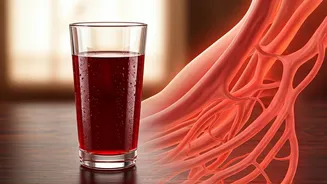Artery Plaque Explained
Artery plaque, also known as atherosclerosis, is a serious condition where fats, cholesterol, and other substances accumulate within the artery walls.
Over time, these deposits harden, narrowing the arteries and reducing blood flow. This buildup can lead to serious complications like heart attacks and strokes. The primary culprit behind this issue is often the lifestyle choices we make. Things like an unhealthy diet, lack of exercise, and smoking accelerate plaque formation. Understanding these risk factors is the first step in prevention. The goal is to keep arteries flexible and wide, allowing blood to flow freely and deliver oxygen and nutrients throughout the body. Early detection and management are key. Doctors may recommend lifestyle changes, medications, or in severe cases, procedures to restore blood flow. Therefore, learning about the beverages which are able to help prevent artery plaque can be beneficial for everyone.
Green Tea's Power
Green tea, a beverage cherished for its numerous health benefits, plays a significant role in heart health. Packed with antioxidants, particularly catechins, green tea helps to reduce LDL cholesterol, often referred to as 'bad' cholesterol, and improve overall cholesterol levels. LDL cholesterol is a primary contributor to plaque buildup in arteries. By minimizing its levels, green tea helps to slow the progression of atherosclerosis. Furthermore, green tea can improve the function of the endothelium, the inner lining of blood vessels, which promotes blood vessel health. Studies have shown that regular green tea consumption is associated with a lower risk of cardiovascular disease. The antioxidants in green tea combat oxidative stress, a process that can damage blood vessels and promote plaque formation. Incorporating green tea into your daily routine is an easy way to support your heart health, offering a refreshing and beneficial addition to your diet.
The Crimson Embrace
Pomegranate juice is rich in antioxidants that have been linked to heart health. These antioxidants work to prevent and reduce artery plaque. Pomegranate juice can help inhibit the oxidation of LDL cholesterol, making it less likely to contribute to plaque formation. Research indicates that consuming pomegranate juice can lead to improved blood flow by enhancing the function of the endothelium, the inner lining of blood vessels. Furthermore, it helps in lowering blood pressure. High blood pressure is a significant risk factor for cardiovascular diseases. Pomegranate juice can aid in maintaining healthy blood pressure levels by relaxing blood vessels and reducing inflammation. In addition to its impact on arteries, it also provides vitamins and minerals. Regularly enjoying pomegranate juice offers a tasty and effective way to protect your heart.
Citrus's Protection
Citrus juices, such as orange and grapefruit juice, provide a wealth of benefits for artery health. These juices are an excellent source of vitamin C and other antioxidants, crucial for fighting free radicals and reducing oxidative stress that contributes to plaque formation. Vitamin C helps in the production of collagen, a protein vital for maintaining the strength and structure of blood vessels. It is also found that citrus juices can enhance blood vessel function, promoting better circulation. Furthermore, grapefruit juice may help lower LDL cholesterol levels and reduce blood pressure. Citrus fruits also contain flavonoids, which have anti-inflammatory properties that protect the heart. Regular intake of citrus juices contributes to a healthier cardiovascular system by providing essential nutrients and reducing the risk of arterial plaque buildup. The refreshing flavors of citrus juices are also a delightful way to support your heart health.
Berry Boost for Arteries
Berry juices, including those made from blueberries, strawberries, and raspberries, offer substantial heart-healthy advantages. These berries are full of antioxidants, such as anthocyanins, which give them their vibrant colors and also provide potent protection against artery plaque. Anthocyanins reduce inflammation and protect against oxidative damage within the blood vessels, supporting their overall health. These antioxidants have been found to decrease the oxidation of LDL cholesterol, stopping plaque formation. Studies also indicate that berry juices can improve blood vessel function and increase the production of nitric oxide, a compound that helps dilate blood vessels and improve blood flow. Regularly consuming berry juices contributes to a decrease in the risk of cardiovascular disease. The enjoyable taste of berry juices also adds a delicious element to a heart-healthy diet.
Tomato Juice's Impact
Tomato juice provides a unique set of heart-protective benefits. Tomatoes are rich in lycopene, a powerful antioxidant that combats free radicals, preventing damage to the arteries. Lycopene has been shown to reduce LDL cholesterol oxidation and reduce plaque formation. Tomato juice can also enhance the function of the endothelium, promoting healthy blood flow and blood vessel function. The nutrients found in tomato juice can contribute to lower blood pressure, which is crucial for reducing the risk of cardiovascular disease. Furthermore, the anti-inflammatory properties of tomatoes can help to prevent the formation of arterial plaque. Including tomato juice in your diet is a simple and tasty way to improve heart health, providing vital nutrients and protecting against the development of artery plaque.





















